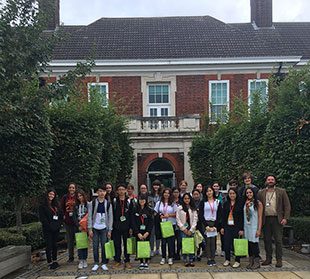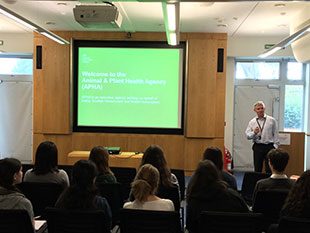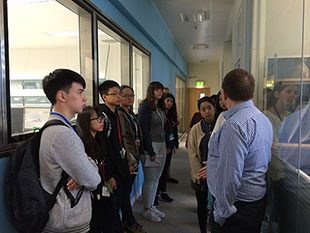APHA has many national and international partners in both academia and research institutes. We also like to help young scientists get an insight into what life is like as a scientist in a government research facility like ours at Weybridge. We often have students coming for work experience as part of various different qualifications, including PhDs.
London International Youth Science Forum
On the 2 August 2016 we hosted 20 students from around the world as part of the 58th London International Youth Science Forum. This forum attracts some of the world’s leading young scientists, aged between 17 and 21, from more than 65 countries.
The students attend a two-week residential event at Imperial College London for a mixture of lectures and demonstrations, as well as visits to industrial sites and research facilities. APHA Weybridge was one of those involved.

Weybridge visit
The students spent a varied and busy day with our scientists. They were able to talk to them about the diverse work of the agency, the research they carry out and how important international collaborations are in the battle against animal diseases.

Professor Ian Brown, Head of the Virology Department, talked to them about avian influenza. He explained about the complex interaction between pathogen and host, how APHA deals with disease outbreaks and why good biosecurity is key to prevention of the spread of disease.
Professor Martin Vordermeier, Head of the Immunology and Vaccine Team, talked about the global importance of bovine tuberculosis (bTB). He spoke about the use of the human TB vaccine, BCG, in cattle and the quest to understand protective immunity so that we can develop better TB vaccines in the future. Martin also emphasized the One Health aspect of his team’s research work and the importance of international collaborators.
Dr Noel Smith, Head of Bovine TB genotyping, gave the students an overview of the global distribution of Mycobacterium bovis, the bacterium that causes bovine TB. He explained how defining the genetic relatedness of strains of M. bovis can be used to understand the worldwide spread of bovine TB linked to the historic movement and trade of cattle.
Following this, Angus Wear, Head of the Surveillance and Laboratory Services Department, explained about the breadth of diagnostic testing across the agency. He outlined how many historical and simple methods are still key to diagnosis today and that they require a high level of expertise. In contrast, highly automated molecular methods are being used more widely. These methods require a different kind of expertise in the careful interpretation of the results.

Tour of the site
The students also went on a tour of the laboratories and visited the farms where they could see more of the hands-on work carried out at our Weybridge site.
The students had a great day and thanked APHA for inviting them to come and see the facilities and learn more about the science we carry out.
Follow APHA on Twitter and don't forget to sign up to email alerts.

Recent Comments